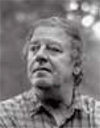The Low Countries. Jaargang 20
(2012)– [tijdschrift] The Low Countries–
[pagina 247]
| |
An Extract from Dateless Days
| |
[pagina 248]
| |
their notice boards covered in postcards wishing the deceased ‘get well soon’ when he was not yet dead. Silence that creates echoes of silence. Deathly silence. At the moment of death everything on the monitors goes haywire, the vital-signs curves on all the screens shrink simultaneously into long, straight, horizontal lines, which would continue into infinity if one of the hospital staff did not pull a bunch of plugs out of the power-point at the head of the bed. As a result the light disappears - phut! - from all the machines, the screens go black and suddenly look like gaping jaws exhaling silence. Such a silence never prevails in this wood, - something is always rustling, something is creaking, a pine cone or an acorn falls onto the sandy path with a drumming sound. Something is always whispering, growling, singing, something is screaming, moving. The leaves fall with a faint sound like rustling paper. A wind gets up, like the wind in my head, where it's never still either, but never still in a different way than in the wood. Shame at everything that has gone wrong. The older you get, the greater the expanse of your past, the more it looks as if your life has consisted of a succession of bankruptcies. It's not only bankruptcies, not everything has gone wrong, but still. There are howlers you have committed deliberately and with premeditation, though you could have known in advance you were doing something stupid. The kind of blunder you'll be confronted with for the rest of your life, comparable with a recurring, incurable disease. When thoughts of it come charging into your brain like armed bandits with nylon stockings over their heads, there's no way of shouting it down to drown out the shame. As you nevertheless start wailing at the top of your voice, you slap yourself in the face with the flat of your hand as you do when a mosquito lands on your cheek and drills its sting into you, you pound your head with the knuckles of both fists until stars and lightning flashes shoot across the backs of your eyes. At night I take to my car and tear along deserted motorways, past black industrial estates, with in the black spaces behind them a vague glow above black cities. Does it make me any calmer? The slurping sound of the tyres on the asphalt makes me sleepy. I enter this wood to walk the restlessness out of my body, but I know everything here too well to be distracted, I go on walking till I'm knackered and sit or lie on the ground if it's not too damp. Try to calm down by counting all the trees in my field of vision - there are more of them in autumn and winter than in summer when there is thick foliage everywhere. One, two, three, four... Or all the toadstools. I turned off onto a side-path, where the red of the toadstool caps had caught my eye like a fever. Scores, several hundred, the path was covered with them as if with a carpet floating a few centimetres above the ground. With every step I made a hole in it, as I kept | |
[pagina 249]
| |
Ga naar margenoot+ kicking over and crushing toadstools. At the end I looked round and saw my footsteps in all that red, all those shades of red - crimson, vermilion, coral, Bordeaux, amaranth, pomegranate... and in it every half-metre the havoc I had caused with my footsteps like a museum vandal who with a knife or a corrosive liquid attacked the Rembrandt red of the Jewish Bride. My eyes became hot and to my troubled gaze the red woodland path liquefied, changed into a stream in which all the tints merged into a single red. By squeezing your eyes shut a few times you can force back your tears. What good are tears to me? A lapping rivulet of blood; the damaged bits my shoes had left in the red filled up with it and again became invisible. When I stopped squeezing my eyes shut, so hard that my ears buzzed, and looked again, there was no longer any question of lapping and flowing: all the red had congealed as if into candle grease, all the red consisted of clotted blood. What good are tears to me? Why do I count tree trunks?
From Dateless Days (Datumloze dagen. Amsterdam: Atlas, 2007) Translated by Paul Vincent |


